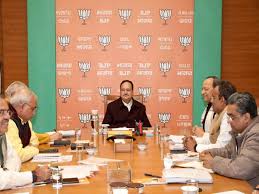JP Nadda led a crucial meeting with BJP General Secretaries, focusing on the upcoming Delhi Assembly elections, organizational issues, and plans to counter the AAP's influence.

BJP Maps Delhi Polls Strategy
In a high-stakes meeting held at the BJP headquarters, party president JP Nadda convened with General Secretaries to outline the strategy for the upcoming Delhi Assembly elections. With the Aam Aadmi Party (AAP) firmly entrenched in the capital, the BJP aims to regain its foothold through a combination of grassroots campaigning and targeted policy narratives.
Sources from the meeting revealed a focus on addressing core voter issues, such as infrastructure development and public services, where AAP has claimed significant achievements. A senior leader described the discussions as “goal-oriented,” with an emphasis on mobilizing local party workers to connect with the electorate.
The BJP is also strategizing to counter AAP's flagship schemes, particularly in education and healthcare. The party intends to highlight what it perceives as gaps in implementation and offer alternative policies during the campaign. Social media outreach, a key component of BJP's electoral arsenal, will play a pivotal role in shaping public perception.
Apart from electoral tactics, the meeting addressed internal organizational challenges, including strengthening coordination between state and central leadership. With several Delhi constituencies witnessing demographic shifts, the BJP sees an opportunity to attract a broader voter base by recalibrating its outreach.
This meeting underscores the BJP's determination to make a strong comeback in Delhi, where it last held power in 1998. However, political observers suggest that the party faces an uphill battle against AAP's established popularity. As Delhi gears up for elections, the BJP’s approach will be a litmus test for its ability to adapt and innovate in urban electoral dynamics.